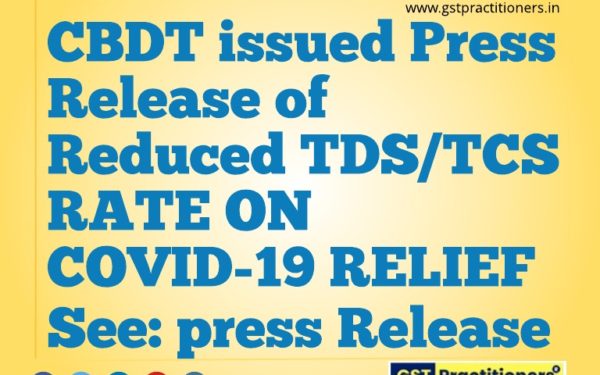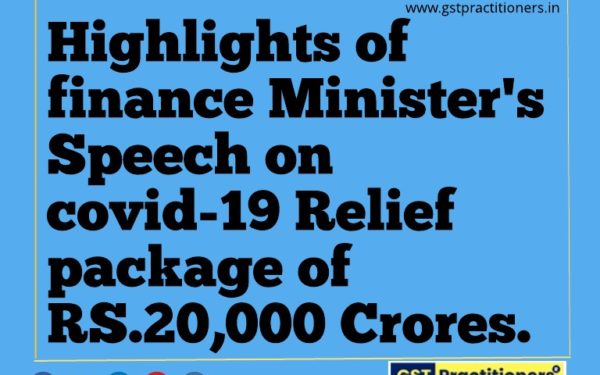TCS UNDER GST ON E-COMMERCE

Tax Collected at Source (TCS)
Tax Collection at Source (TCS) has similarities with TDS, as well as has distinctive features also. TDS refers to tax which is deducted when recipient of goods or services makes some payments under a contract etc. while TCS refers to tax which is collected by the electronic commerce operator when a supplier supplies some goods or services through its portal and the payment for that supply is collected by the electronic commerce operator. We will discuss the exact nature of TCS with an example.
There are many e-Commerce operators, like Amazon, Flipkart, Jabong, etc. operating in India. These operators displays / lists on their portal products as well as services which are actually supplied by some other person to the consumer. The goods or services belonging to other suppliers are displayed on the portals of the operators and consumers buy such goods/services through these portals. On placing the order for a particular product/ services the actual supplier supplies the selected product/services to the consumer. The price/consideration for the product/services is collected by the Operator from the consumer and passed on to the actual supplier after deducting his commission by the Operator. The Govt. placed the responsibility on the Operator to collect the ‘tax’ at a rate of 1% from the supplier. This shall be done by the Operator by paying the supplier the price of the product /services, less the tax, calculated at the rate of 1%. The said amount will be calculated on the net value of the goods/ services supplied through the portal of the operator. Suppose a certain product is sold at Rs. 1000/- through an Operator by a seller. The Operator would deduct tax @ 1% of the net value of Rs. 1000/- i.e. Rs. 100/-. Let us have a look at the statutory provisions relating to TCS.
Registration:
The ecommerce operator as well as the supplier supplying goods or services through an operator need to compulsorily register under GST. The threshold limit of Rs. 20 lakhs (10 lakhs for special category states) is not applicable to them. Section 24(x) of the CGST Act, 2017 makes it mandatory for every e-Commerce Operator to get registered under GST. Similarly, section 24(ix) of the CGST Act, 2017 makes it mandatory for every person who supplies goods/services through an Operator to get registered under GST. Power to collect tax: Section 52 of the CGST Act, 2017 provides for Tax Collection at source, by e-Commerce operator in respect of the taxable supplies made through it by other suppliers, where the consideration in respect of such supplies is collected by him. TCS Statement: The amount of tax so collected by the TCS Mechanism under GST
operator is required to be deposited by the 10th of the following month, during which such collection is made. The operator is also required to furnish a monthly statement in Form GSTR-8 by the 10th of the following month. The
Operator is also required to file an Annual statement in prescribed form by the 31st of December following the end
of every financial year. The Operator can rectify errors in statements filed, if any, latest by the return to be filed for the month of September, following the end of every financial year. The details furnished by the operator in GSTR-8 shall be made available electronically to each of the suppliers in Part C of FORM GSTR-2A on the Common Portal after the due date of filing of FORM GSTR-8. Credit of tax collected: The tax collected by the operator shall be credited to the cash ledger of the supplier who has supplied the goods/services through the Operator. The supplier can claim credit of tax collected and reflected in the return by the Operator in his [supplier’s] electronic cash ledger. Matching of details of supplies: The details of the supplies, including the value of supplies, submitted by every operator in the statements will be matched with the details of supplies submitted by all such suppliers in their returns. If there is any discrepancy in the value of supplies, the same would be communicated to both of them. If such discrepancy in value is not rectified within the given time, then such amount would be added to the output tax liability of such suppler.
The supplier will have to pay the differential amount of output tax along with interest.
Notice to the Operator:
An officer not below the rank of Deputy Commissioner can issue notice to an Operator asking him to furnish details relating to volume of goods/ services supplied, stock of goods lying in warehouses/ godowns, etc. The Operator is required to furnish such details within 15 working days. In case an Operator fails to furnish the information, besides being liable for penal action under section 122 shall also be liable for penalty up to Rs. 25,000/-.
E-commerce companies from October 1 will have to deduct 1 per cent tax collected at source (TCS) before making payments to their suppliers. Notification No.51/2018-Central Tax ,dt. 13-09-2018
The Central Government, on the recommendations of the Council, hereby notifies that every electronic commerce operator, not being an agent, shall collect an amount calculated at a rate of half per cent. of the net value of intra-State taxable supplies made through it by other suppliers where the consideration with respect to such supplies is to be collected by the said operator. Notification No. 52/2018 – Central Tax
The Finance Ministry Thursday notified TCS at the rate of 0.50 per cent of the net value of intra-state taxable supplies made through the e-commerce portals by other suppliers in the Central Tax law.
States too would follow suit and notify levy of 0.50 per cent SGST on intra-state supplies.
In the case of inter-state supplies by the e-commerce companies, Integrated GST (IGST) at the rate of 1 per cent would be deducted in the form of TCS while making payments to suppliers.
The ministry had last week notified October 1 as the date for implementation of the TCS provision under the Goods and Services Tax (GST) law. The law provided levy of up to 1 per cent TCS. TDS/TCS provisions of GST laws were kept in abeyance till June 30. Later on, it was deferred till September 30, 2018. TCS provision would increase compliance burden for e-commerce companies but help government in checking tax evasion.

K.C.MAHATO is expert in GST Consultancy and has an experience of more than 10 years in Indirect tax , Direct Taxes and the accounting profession. He is also giving GST Practical Training to Students and SME Traders. He provide services that most effectively meet client needs. Her experience is concentrated in performing GST Laws & Practices and compliances of gst in a variety of industries.


